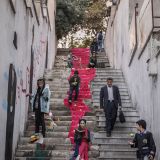Maryam Firuzi
Reading for Tehran Streets
Polyterrasse / ETH und Lindenhof
Vitruvius, the Roman architect, used the word street for the first time and by describing its sceneries, divided urban sites into three categories: Tragic, comic, and satiric. In Tehran’s continual turmoil, the scenery is more tragic rather than satiric.
“My relation with the city is always turning into a complex, as long as I am moving in the street and its sights, tragic or comic, fade away with no pause. I find shelter among the walls of my house and leave behind the sad turmoil of Tehran in the heart of its streets. Each day, we the urban travellers leave our imaginations and dreams in our houses, and without finding any perception in the tragic, comic, and satiric scenery of Tehran, along with other fellow passengers, pass through the streets, so fast that we forget the route, considering only our beginning and destination. Streets have become a place for overtaking not for contemplating. Hereon, I step into the city. I make my personal moment public. I read books. I intermix my imaginations with the city. I freeze myself among my own imaginations; maybe it would make us stop for a moment and find our relation with each other. It might make the streets a place for contemplation and communication and extend the spirit of the city.”
Reading! If people would read more, Firuzi claims, the world would be a more peaceful, a better place. Because reading would make you more tolerant, creates empathy for others and understanding for a life other than your own. This work is about encouragement. About a sign of respect for those who still dream.
Maryam Firuzi, born in Shiraz, Iran, in 1986, turned early to Persian calligraphy and literature, later to painting. She has a Diploma in mathematics, a Bachelor in software engineering. She studied at the Art University in Tehran, finishing with a Master in Cinema.
Curated by Lois Lammerhuber / Printed by ![]()
Discover here contributions of ETH Zurich to the Sustainable Development Goal (SDG) 4:
A space to innovate
ETH Student Project House
The ETH Student Project House is a learning space that offers a dynamic environment where students can actively pursue their passions, nurture their own ideas, and embrace complete ownership of relevant extracurricular endeavours.
From theory to practice
All students from ETH Zurich who are working towards their Bachelor’s, Master’s and Doctoral degrees have access to this space. It enables them to transform ideas into concepts, and from there into tangible projects as part of a comprehensive innovation journey. It begins by identifying a meaningful topic close to their hearts. The students then cultivate solutions to address the problem, and work through a rapid cycle of prototyping, testing, and refining their ideas based on user input.
In the process, they gain invaluable experience in collaborative teamwork, decision-making, learning from setbacks, exploring cutting-edge technologies – and, above all, fostering the confidence to embrace the innovation journey wholeheartedly.
At the very moment, the Student Project House supports more than 300 active projects, whereas this number grows exponentially. Around 70% of these projects focus on topics related to sustainability across its social, economic and environmental dimensions. The space is designed to foster a mindset geared towards creating, innovating and leading impactful change.
Learning from mistakes
Setbacks are part of the creative process. The SPH offers a safe space for young bright minds at ETH to make mistakes – and learn from them swiftly. It instills the idea that it is much better to learn from failures rather than to strive to avoid mistakes at all costs. It also encourages students to be more confident as they work to realise their ideas, to explore their entrepreneurial potential and, most importantly, to follow their passions.
“I think it’s crucial that all generations have a basic knowledge of innovation. Nowadays, the world is changing at an accelerated speed. It’s not only about gaining acquired knowledge, but having a mindset to adapt to rapidly changing environments.”
Dr. Lucie Rejman, Head of ETH Student Project House
Students step up on carbon removal
Circular Horizon
Circular Horizon is a student organisation developing a more efficient and scalable carbon removal technology. The team includes Bachelor’s, Master’s, and Doctoral degree students who invest their time and talents to support their cause.
Joining forces for positive impact
Circular Horizon’s vision is to create a world where everyone has access to the knowledge, resources, and power to take meaningful action on climate change. It strives to educate and empower individuals, communities, and organisations to take action both at the local and global levels. The student members believe that each one of us can make a positive impact on the planet and ensure a healthy and sustainable future for all.
Circular Horizon focuses on three key areas of work: promoting a scalable solution for carbon removal, fostering education and research initiatives, and investing in community-building events. The significance of their research-based work lies in its relevance to society, as everyone is now experiencing the impacts of climate change. By improving on methods to actively extract carbon dioxide from the atmosphere, the organisation can also make a valuable contribution towards mitigating climate change, which in turn lowers the risk of extreme weather events, sea level rise, and instability in ecosystems and human societies.
Calling for climate action
Circular Horizon motivates individuals to support initiatives focused on carbon removal and climate action. We can all actively engage in sustainable practices in our daily lives, for example to reduce our carbon footprint by choosing energy efficient devices, practising conscious consumption and advocating for environmentally friendly policies. The organisation believes firmly that by coming together as a community, citizens can drive positive change and create a more sustainable world.
“As a society, it is imperative that we strive for sustainable solutions that effectively combat climate change and pave the way for a brighter future for both present and upcoming generations.”
Timo Schneider, Team President, Circular Horizon
Driven to build high-tech transport
Swissloop
Swissloop is a student-led initiative contributing to research and advancement of Hyperloop high-speed transport technology. Driven by a mission to raise public awareness of Hyperloop’s impact on future transport and mobility, they design and build each year a new high-tech transport capsule or ‘pod’ to increase its performance.
The Hyperloop concept
Popularised in a 2013 report by Elon Musk and others at Tesla and SpaceX, the Hyperloop concept lays out a vision of travel through low-air pressure tubes. Swissloop’s latest Pod, „Bertrand Piccard“, accelerates using a linear switched reluctance motor (1.6g), levitates and guides itself with electromagnetic suspension while virtually moving through an environment of no air resistance in vacuum-sealed tubes above or below the ground. This innovative approach promises better and more sustainable long-distance travel by combining the advantages of modern railways and air travel. It is expected to reach speeds of up to 1,200 km per /hour – faster than average airplane speeds – and improve energy efficiency, while operating quietly and with more autonomy than existing systems.
The project empowers students to commit to a cause and a specific project each year. Through an ETH-wide programme called Fokus, they have the opportunity to work at any time of the day or week on the chosen projects alongside their peers. This hands-on experience allows them to delve into engineering, development and innovation, fostering a profound sense of dedication to their work.
Room for growth
The student-led initiative Swissloop is a ‘think and do-tank’. The project teams aim not only to develop advanced pods, but also their own high-speed transport systems. The initiative has seen its students grow immensely by working together through occasional setbacks to reach important milestones and achieve success. This collaborative process encourages them to believe in, and be hopeful for, a better future.
Even though today’s challenges can seem overwhelming, the members of Swissloop firmly believe in their problem-solving abilities, in keeping spirits high to pursue promising projects, and in the power of human adaptability.
Swissloop recently competed at the European Hyperloop Week 2023. Swissloop won five awards, including the “Complete Systems Award”. Next year’s edition will take place in Zurich.
“I wholeheartedly believe that education is the key. It holds the potential to transform behaviour, culture, and paves the way for a more sustainable and brighter future.”
Thomas Baptistal, European Hyperloop Week Organisation Lead, Swissloop
Problems solved through collective intelligence
Christian Pohl, Marlene Mader
In 2020, Marlene Mader and Professor Christian Pohl from the ETH Transdisciplinary Lab (TdLab) won the ETH Kite Award with their innovative course ‘Environmental Problem Solving’. Each year, through the course they take around 120 new Bachelor’s degree students of Environmental Systems Science on a journey in problem-focused and project-based learning.
Design and systems thinking at its best
Over two semesters, the students learn to work on environmental problems based on a concrete case-study. In 2022/23, for example, the focus was on the net zero climate goal of the city of Zurich. Supervised by Marlene and Christian with a team of lecturers, tutors and practitioners, the students work step by step from an initial analysis of the challenge all the way through to the practical implementation of measures designed to address it.
Collective intelligence
The transdisciplinary teaching team working with Marlene and Christian is convinced that a holistic view of the topic is crucial – as is the process of developing feasible measures in collaboration with partners. This is possible only by integrating diverse perspectives, practical expertise and local knowledge.
It’s a process that relies on teamwork. In addition to working on the environmental problem at hand, the students learn how to cooperate effectively, using journals among other methods that encourage reflection.
Those who are keen to implement the solutions they developed during the two semesters can continue their work with a pilot project in an optional third semester. The focus of the pilot is usually to scope out funding options, obtain permits, clarify intellectual property rights, and deepen the collaboration with partners involved in executing the project.
Entrepreneurial ecosystem
ETH Zurich offers an innovation ecosystem for this type of solution-oriented learning and early entrepreneurial work, which provides a fertile breeding ground for high-quality education to solve the social sustainability challenges of our time.
“Together we all go through an iterative and reflexive process in environmental problem solving; the motto here is ‚failing forward‘.”
Marlene Mader and Prof. Dr. Christian Pohl, ETH Transdisciplinary Lab (TdLab) at the Department of Environmental Systems Science
Learning for a better future
ETH Rektorat
By educating a qualified workforce, ETH Zurich makes a significant contribution to the economy and society. It counted exactly 5765 graduates in 2022: approximately 2,000 Bachelor’s, 2,500 Master’s and 1,000 Doctoral students, as well as around 300 graduates of teacher education and continuing education programmes. ETH Zurich trains its students to become independent and creative thinkers who take responsibility as active members of society and help shape the future. This empowers them to identify problems and find solutions in a complex world.
Networked, critical thinkers
ETH Zurich motivates its students to think creatively across disciplines and cultural boundaries, to evaluate complex problems from a holistic perspective, to adopt an attitude based on ethical principles, and to act as responsible citizens. Its graduates carry these competencies into their professional positions and their daily lives.
To highlight those courses that teach responsible action which takes into account the principles of sustainable development, ETH Zurich provides specific information on a curriculum based on the SDGs alongside the regular course catalogue.
Culture of responsible learning
The university fosters a culture of self-directed and responsible learning, which promotes students’ individual strengths. To ensure a high quality education, it creates an environment where teaching approaches are continuously improving using modern methods and technologies as well as the latest science.
„In education, we need to take a big step towards systemic thinking. We still need the depth of subject specialisation in our degree programmes to be able to solve the problems of our world. But we need to strengthen our ability to recognise systems and their interdependencies, and to be able to approach them holistically in interdisciplinary approaches.“
Prof. Dr. Günther Dissertori, physicist and Rector of ETH Zurich
Learning how to code with a smartphone
George Boateng
Dr. George Jojo Boateng is a highly recognised computer scientist, engineer, educator, and social entrepreneur. He is also the CEO and Cofounder of Kwame AI Inc., an AI start-up enabling learners and knowledge workers such as educators and lawyers to improve their outcomes and productivity.
Lack of access to computers
During their annual innovation bootcamp in Ghana, George and his co-founder found that only 25% of their students had laptops, but all of them owned smartphones. This led them to create a groundbreaking coding course, which equipped Ghanaian students with the skills to build pong games on their phones and even code during their commutes. Inspired by this success, in 2018 they launched ‘SuaCode’, an online programme designed to teach coding using smartphones to millions of African students.
Gaining 21st-century skills in Africa
Africa has the world’s largest and youngest workforce: nearly 60% of the population is under 25 years of age. But youth unemployment remains a significant challenge, affecting around 16 million young Africans or 13.4% of 15-24-year-olds. The problem stems from limited access to education that meets modern job-market demands. Most African youths lack vital 21st-century skills such as digital literacy, and only a fraction graduate with basic coding skills. Although smartphones are prevalent, access to computers for learning remains low. Exploiting the smartphone boom can offer a solution by teaching coding skills to millions, empowering Africa’s youth for a brighter future.
George believes that challenges bring opportunities for innovation. His research has shown that smartphones can serve as an effective and accessible platform for introducing coding skills to African communities. This paves the way for promoting coding education in low-resource areas worldwide.
“My vision is to shape a world where millions of young Africans grow up getting coding skills right from their smartphones, which will consequently result in improved economic prospects for them.”
Dr. George Jojo Boateng, Postdoctoral Researcher at ETH Zurich
open your eyes festival buerau
Botenaustrasse 42
9443 Widnau
Switzerland
Phone: +41 44 218 11 03





